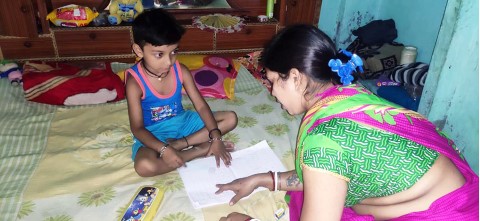
KANSAS CITY, Mo. (December 22, 2020) - Early childhood is a critical time that lays the foundation for lifelong learning — the development of a child’s brain will affect their physical and mental health throughout their lives. Although India is placing a growing focus on early childhood education, substantial numbers of children are still not enrolled in preschools. Impoverished families, in particular, struggle to find affordable early education programs.
The quality of education — especially early childhood education — in the Bawana and Shahabad Dairy communities outside of Delhi, India, is abysmal. About 80% of children under 6 years old in Bawana have never participated in preschool education, according to a Children International survey conducted in 2013.
With support from the Guru Krupa Foundation, Children International is helping to fill the early education gap in India. Through Children International’s Early Childhood Care and Development (ECCD) program, young children learn simple mathematical skills, language development, hand-eye coordination and emotional and social development.
Over the last year, as the coronavirus pandemic forced school closures, the education of children around the world has become a central issue. The Guru Krupa Foundation continues to provide funding to Children International’s ECCD program in India, and this year, their support has been especially critical.
“GKF has been supporting Children International programs in Delhi since 2015 (and in West Bengal before then),” said Mukund Padmanabhan, president of Guru Krupa Foundation. “We recognize the value of the educational support provided by these programs to impoverished children, and are very happy to be able to continue funding them, especially in these days of learning loss amidst COVID-related school shutdowns.”

Asha, an ECCD teacher in Delhi, took to WhatsApp to connect with parents and devise a plan for continuing their children’s education. The social networking app is a common tool for communication among our families. Asha created two WhatsApp groups, one for 3-year-olds and for 4-year-olds.
“Every day I share videos and one or two worksheets in these WhatsApp groups,” Asha said. “Along with that, I prepare and share voice messages for children and parents to complete worksheets. In this way, through the ECCD program, we are guiding the children with the help of the parents. Parents send photos of the work done by children, and I check the work and respond to them.”
The consistent support the Guru Krupa foundation allows Children International to provide is a source of stability for many parents.
“Children International’s ECCD program helped us a lot during this painful situation,” said Priyanka, mother of sponsored child Anuj (pictured at the top). “They started online lessons with interesting activities to engage children in their studies and provide opportunity for continuous learning.”
Children International prioritizes education at all levels. Learn more about Children International’s education programs.
Children International, based in Kansas City, Missouri, USA, is a global nonprofit that delivers child and youth development programming to break generational cycles of poverty. From childhood through young adulthood, Children International empowers young people in Colombia, Ecuador, the Dominican Republic, Honduras, India, Guatemala, Mexico, the Philippines, Zambia and the United States to forge a path out of poverty through access to health care, educational support, positive role models, and the life and job skills they need to become sustainably employed. When equipped to improve their own lives, young people also transform their families and communities, for generations to come. For more information, visit children.org.
Comments
You must be logged in to comment. If you have an account, click here to log in.